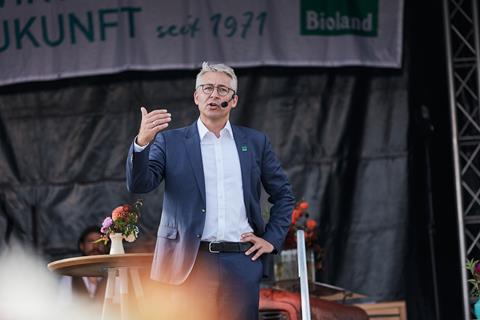The EU Commission’s proposal under the new Common Agricultural Policy to leave it to Member States to finance agri-environmental measures has come under fire from IFOAM Organics Europe

The EU Commission’s proposal to safeguard Common Agricultural Policy (CAP) money only for area-based payments is “unbalanced and unfit for a future-proof public policy”, according to Jan Plagge, president of IFOAM Organics Europe.
IFOAM Organics Europe has called for a clear ringfencing of CAP money for the environment, the climate and animal welfare in order to provide a “predictable path” for farmers towards sustainability.
“Like it was recommended by the Strategic Dialogue on the future of agriculture that was convened by President Ursula von der Leyen, at least one third of the CAP budget should be ringfenced for the protection of ecosystems services including organic farming,” said Plagge. “Without a clear direction towards sustainability given by the EU budget and the CAP, there will be a race to the bottom among Member States, that will endanger our European food sovereignty. The governance framework of the Fund and the CAP needs to be strengthened to ensure that the increased flexibility for Member States does not lead to a de-prioritisation of sustainability initiatives.”
The European organic movement has welcomed the recent recognition of organic farming – that it is a key policy instrument in the post-2027 CAP – but warned that organic farmers required “stable policy support”.
“Organic farming is an essential public policy tool that should have a central place in a framework based on incentives and simplification, to make sustainability the easiest choice,” said Plagge. “While many decisions on the CAP will have to be taken at national level, organic agriculture is the simplest and most efficient way for Member States at the administrative level while ensuring high environmental ambitions, since it is legally regulated at the EU level and already has strong certification systems in place.”
The European movement called for better incentives and support for farmers to engage in an ambitious environmental re-design of their farms that will make them resilient to future social and environmental crises.
“Organic agriculture is a simple solution that delivers high environmental benefits and socio-economic benefits for farmers and society, by preserving the health of farmers and consumers, increasing the profitability and resilience of farms, playing a key role in generational renewal and revitalising rural areas,” added Plagge. “Policymakers need to ensure that the public goods delivered by organic farmers are adequately remunerated through the CAP. Farmers will engage into sustainability if it is profitable, so we need a level playing field in the EU to ensure that sustainability pays off for farmers.”



